Related Research Articles

Samoa, officially the Independent State ofSamoa and until 1997 known as Western Samoa, is a Polynesian island country consisting of two main islands, two smaller, inhabited islands, and several smaller, uninhabited islands, including the Aleipata Islands. Samoa is located 64 kilometres west of American Samoa, 889 kilometres northeast of Tonga, 1,152 kilometres northeast of Fiji, 483 kilometres east of Wallis and Futuna, 1,151 kilometres southeast of Tuvalu, 519 kilometres south of Tokelau, 4,190 kilometres southwest of Hawaii and 610 kilometres northwest of Niue. The capital city is Apia. The Lapita people discovered and settled the Samoan Islands around 3,500 years ago. They developed a Samoan language and Samoan cultural identity.

The Samoan Islands were first settled some 3,500 years ago as part of the Austronesian expansion. Both Samoa's early history and its more recent history are strongly connected to the histories of Tonga and Fiji, nearby islands with which Samoa has long had genealogical links as well as shared cultural traditions.

Apia is the capital of Samoa, and its only city. It is located on the central north coast of Upolu, Samoa's second-largest island. Apia falls within the political district (itūmālō) of Tuamasaga.
Samoan culture tells stories of many different deities. There were deities of the forest, the seas, rain, harvest, villages, and war. There were two types of deities, atua, who had non-human origins, and aitu, who were of human origin.

Tuvaluan, often called Tuvalu, is a Polynesian language of or closely related to the Ellicean group spoken in Tuvalu. It is more or less distantly related to all other Polynesian languages, such as Hawaiian, Māori, Tahitian, Samoan, and Tongan, and most closely related to the languages spoken on the Polynesian Outliers in Micronesia and Northern and Central Melanesia. Tuvaluan has borrowed considerably from Samoan, the language of Christian missionaries in the late 19th and early 20th centuries.
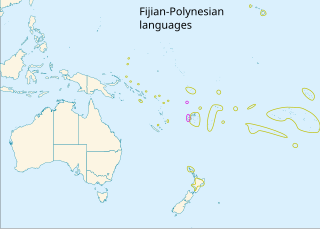
The Polynesian languages form a genealogical group of languages, itself part of the Oceanic branch of the Austronesian family.
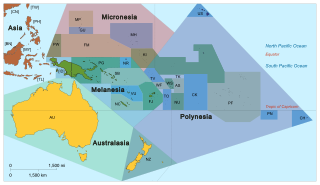
Pacific Islanders, Pacificer, Pasifika, or Pasefika, are the peoples of the Pacific Islands—particularly those who are indigenous to them.

Vaitupu is the largest atoll of the nation of Tuvalu. It is located at 7.48 degrees south and 178.83 degrees west. There are 1,061 people living on 5.6 square kilometres with the main village being Asau.
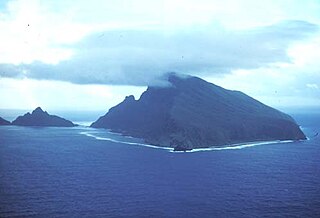
The Samoan Islands are an archipelago covering 3,030 km2 (1,170 sq mi) in the central South Pacific, forming part of Polynesia and of the wider region of Oceania. Administratively, the archipelago comprises all of the Independent State of Samoa and most of American Samoa. The land masses of the two Samoan jurisdictions are separated by 64 km (40 mi) of ocean at their closest points.

Togiola Talalelei A. Tulafono is an American Samoan politician and lawyer who served as the 56th Governor of American Samoa. He is a member of the Democratic Party. He had previously served as lieutenant governor, taking this position on January 3, 1997.

Samoans or Samoan people are the indigenous Polynesian people of the Samoan Islands, an archipelago in Polynesia, who speak the Samoan language. The group's home islands are politically and geographically divided between the Independent State of Samoa and American Samoa, an unincorporated territory of the United States of America. Though divided by national border, the culture and language are the same.

Gagaʻemauga is a district on the island of Savaiʻi in Samoa. The district is situated on the central north side of Savaiʻi. The name 'Gagaʻemauga' literally means "near side of the mountain", meaning the eastern side of the mountain chain running through the centre of Savaiʻi Island.

Wikimedia Atlas of American Samoa
Velega Savali Savali Jr. is an American Samoan politician. Savali was a candidate for Lieutenant Governor of American Samoa in the American Samoan gubernatorial election in 2008. He served as the American Samoa Treasurer from 2005 until 2008, and a senator from 2009 to 2012.
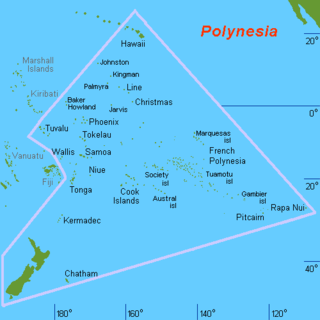
Polynesia is a subregion of Oceania, made up of more than 1,000 islands scattered over the central and southern Pacific Ocean. The indigenous people who inhabit the islands of Polynesia are called Polynesians. They have many things in common, including language relatedness, cultural practices, and traditional beliefs. In centuries past, they had a strong shared tradition of sailing and using stars to navigate at night. The largest country in Polynesia is New Zealand.
George Pratt (1817–1894) was a missionary with the London Missionary Society who lived in Samoa for forty years from 1839 to 1879, mostly on the island of Savai'i. Pratt was from Portsea, Portsmouth in England. He also served in Niue, the Loyalty Islands and New Guinea. In Samoa, Pratt lived at a mission station in Avao Matautu on the north coast of Savai'i island.

John Edward Bush, also known as John Edwin Bush, was a politician and newspaper publisher in the Kingdom of Hawaii.
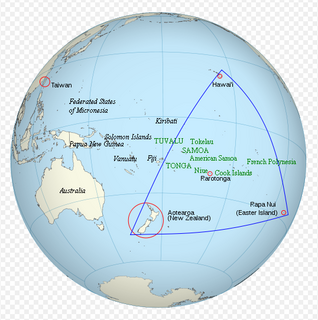
The Polynesian Leaders Group (PLG) is an international governmental cooperation group bringing together eight independent or self-governing countries or territories in Polynesia.
Savali Talavou Ale is an American Samoan politician. He has served as the Speaker of the American Samoa House of Representatives since 2007. Ale, who was first elected to the House of Representatives in 1981, is also the longest serving current member of the American Samoa House of Representatives, as of 2015.
Tunumafono Apelu Aiavao was a Samoan journalist, editor, writer, and educator. He was editor of the government-owned Savali newspaper from 1979 to 2000 and the Congregational Christian Church of Samoa run Sulu Samoa from 2007 — 2018, and authored several volumes of short stories.
References
- ↑ John Fraser (1892). "The Samoan story of creation: a tala". Journal of the Polynesian Society. 1 (3): 186. Retrieved 2 March 2021.
- ↑ "A translation of the first copy of the "Savali" (newspaper in the Samoan language) printed by direction of Dr Solf one time German Administrator of Samoa". 1905. Retrieved 2 March 2021– via NZETC.
- ↑ "Savali Newspaper". Government of Samoa. Retrieved 2 March 2021.